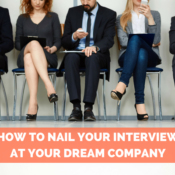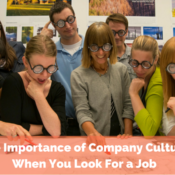Author: Design Workshop Human Resources
How to Write a Cover Letter to Get You Noticed
Though it’s exciting to think about the possibilities in a new role or at a new company, job searching is a challenge. It’s daunting to comb through job boards, looking for positions that match your skill set and companies that match your values. It’s exhausting packing your calendar with networking events, engaging in small talk to make connections. And, it’s tricky to present yourself to a potential employer on paper. How can you portray your unique personality in neatly organized paragraphs not exceeding one page? It’s possible. And, it’s not nearly as hard as you think.
Let’s start with a cover letter. Yes, you do need to write one, unless it is explicitly stated within the job posting that it’s not necessary. Failure to include a cover letter will likely automatically reject you from further consideration, because recruiters want to see candidates that follow directions. I read each and every word of the cover letters that come through the door at Design Workshop. Combined with your resume and portfolio, I can get a good sense of whether or not you’d be a match for the hiring manager and the job functions. It’s important to not simply repeat resume details on your cover letter too. Here’s what I look for.
Strong Writing Skills: Not only does a well-written cover letter helps me understand more about you, it’s a good demonstration that you have the necessary skills to communicate effectively in the work place. It is essential that you have strong writing skills and are able to communicate effectively. Writing emails, proposals, and other professional collateral will be a significant part of your daily work, and effectively writing is essential. Skip the prescriptive opening sentence from online samples and dive right into an attention-grabbing statement that tells me why you are the right person for this role. If you’re having a hard time getting started, try a brainstorming exercise. The thoughts will come together more cohesively with a visual of your preliminary ideas.
Keep the cover letter to one page. Read the letter aloud to listen for fluency in your thoughts. Keep your language simple and concise; if you wouldn’t say it aloud, don’t write it that way either. Don’t forget to proof-read!
Personalization: Reference the name of the company to which you’re applying, and do some research to find the name of someone to whom you can address the salutation. It’s as easy as calling the company and asking or doing website research to find the name of the CEO. Don’t forget to change this information when you send the letter to multiple companies. Nothing bugs me more than a generic cover letter, or one with the name of a competitor on it. Why are you interested in our company? What about our company excites you? Is there a company project that inspires you to be part of their team? Speaking of which…
Understanding of the Role: The best way to do this is through research. Spend some time on the company website so that you understand the challenges facing the organization, and don’t stop there. Connect with the company’s social media and follow leadership’s posts on LinkedIn. Check out sites like Glassdoor that can reveal more information about what it’s like to work at the company. Read through the job advertisement and/or job description. When you sit down to write your cover letter, you’ll be able to connect your education and experiences to what the role entails and what the company needs.
Express Yourself: Ask not what this role can do for you, but what you can do for this role. What professional or personal experiences have led you to wanting this job? If you have less experience or are just starting your career, what technical and soft skills do you bring with you? Highlight all of this! Never apologize for skills that you don’t have during the application process. Instead, focus on your strengths and create a compelling story around your candidacy.
Excitement: Showing enthusiasm for the role is one way that you can convey your personality through paper. Is there a certain project or value at our company that fires you up? What about the work that we do aligns to your passions? How do you see your own value proposition within ours? What do you respect about our organization? Companies want to hire people who fit within their own mission and vision. It’s a clear indicator that the person will seamlessly onboard and integrate with the company. Note that while showing personality is good, it’s advisable to keep your language professional. Also, toe the line between flattery and kissing you-know-what. Authenticity is your best bet.
We spend too much time at work to not love our jobs, and loving your job comes from applying and acing the recruiting and interviewing process at your dream company. Approach your career search with enthusiasm and apply only for positions where you can see a long-term cultural fit within yourself. Focusing your energy on the jobs and companies that you really want will be more fruitful than sending stock cover letter and resumes all over town. Try to enjoy the process and take pride in marketing yourself. Good luck!
—
For more than four decades, Design Workshop has provided landscape architecture, planning, urban design and strategic services to clients in North America and throughout the world. We are committed to creating special places that meet today’s needs and that are sustainable environments for all time. We believe that when environment, art, community and economics are combined with the dictates of the land and the needs of society, magical places result—sustainable places of timeless beauty, significant value and enduring quality, places that lift the spirit. We have developed a methodology called DW Legacy Design®. This proprietary process seeks to imbue every project with a balance between environmental sensitivity, community connection, artistic beauty and economic viability that demonstrates measureable results.
How to Nail Your Interview at Your Dream Company
After nearly six years as an HR professional, and three years spent exclusively in recruiting, I have a golden line that I’d like to share with you about interviewing.
Interviewing is much more of an art than a science.
What, you say? How on earth could it be an art? Aren’t companies looking for the perfectly rehearsed answers?
No, they aren’t. That doesn’t help anybody.
Trust me, the interviewing process is an act of both planning and spontaneity. Having a rigid script won’t work, no matter what side of the table you’re on. There’s no need to be sterile in an interview. You can show who you are, highlight your strengths and skillsets, while letting your unique personality shine through.
So, let’s back up. You wrote, rewrote and perfected your cover letter. Your resume is sparkling. Your portfolio is polished. You get a call from a hiring manager who invites you to the office for an interview. Things. Are. Happening.
This is actually your first opportunity for professionalism to shine. When you’ve applied for a job and an unknown number calls you, pick up. If you’re unable to pick up for a very serious reason like you’re in class or a meeting, make sure you have space on your voicemail for me to leave a message. There is nothing more frustrating than calling a candidate and getting a voice mailbox that is full or not yet set up. Equally frustrating is when a candidate has no recollection of applying to your organization. Remember where your applications are and be ready to jump into insta-professional mode!
Now, hopefully you’re still reading this, even though I suggested actually answering your phone. It’s really not as scary as you think.
Once you confirm a time and date with the hiring manager, you can begin to prep for your interview. The best place to do this is the internet. First, visit the company website. Look around. Try to find the mission, vision and values of the company. Reflect upon them. How do they resonate with you? Do you identify with what the company does and how they achieve their goals? Taking the time to define your career vision and making sure that you consider your own fit within a company will benefit you greatly. Be familiar with these values and how they shape the work the company does. Speaking of what the company does, it will behoove you to also understand the business and the business model. What’s the structure? What products and services does the company offer? Do you understand how your potential role works within that bigger picture? Who are their competitors, and what makes this company unique? While you’re mulling over all of this, be sure to write down questions as they come up.
Once you feel comfortable with how the company operates within their competitive advantage to deliver their product or service, it’s time to practice behavioral questions. Every interview will seek to find out more about your integrity, problem solving, communication, motivation, self-awareness and interpersonal skills. Interviewers want to walk away from an interview understanding a candidate’s competencies, abilities, skillsets and experiences. Take the time to research potential interview questions online. Practice your answers out loud, or have a (serious, similarly goal-oriented) friend mock interview you. Give detailed enough answers that the interviewers have depth, but don’t ramble. If you can give a concrete example to relate to one of the questions, kudos! In the ‘biz we call these PAR anecdotes. The P stands for problem. What was the situation you faced? The A stands for action. What was done to solve the problem? The R stands for result. What was the outcome? PAR anecdotes are super helpful to reveal relevant experiences, especially when faced with behavioral/fit questions. Anytime that you are able to link your experiences to the company with whom you’re interviewing, you are making hiring manager’s dreams come true.
Take a minute here to think about YOUR personal brand. Your personal brand is created and maintained through your presence and actions. What kind of things do you want to communicate to this potential future employer through this presence and these actions? Visualize it. Positive visualization is one of the most powerful tools we have for affecting outcomes.

Taking the time to research the company and prepare your answers will go a long way when you’re finally in front of the hiring managers. Spiff yourself up, dress smart, and bring copies of your application materials. Know where you’re going, where to park, how to get into the building, and who to ask for once you arrive. Only arrive less than five minutes early. People in offices are busy and when candidates show up on Lombardi Time it throws everyone off. File “arriving early” under not having space in your voice mailbox.
Then, relax. You’ve made it SO far! You’ll be shown into a room with your interviewers. You’re interviewing them just as much as they’re interviewing you. This two-way street is testing company and cultural fit in both directions. For this reason, it’s important to be yourself (the professional, polished version of you, recent grads). You’re going to be much happier in the long-term at a company where the corporate culture matches your own career vision.
At the end of your interview, the hiring manager will ask you what questions you have. At this point, ask those intelligent questions you crafted, and don’t be afraid to ask the hard questions. My personal favorite trick is to ask “is there any reason at this time that you’d hesitate to hire me?” It’s forward and honest and it gives you the chance to further explain in the face of any such hesitation.
Thank your interviewers for their time, shake their hands and write a follow-up thank you email by the end of the day. Then take some time to think about your experience. Can you see yourself fitting into the company culture and going to work there for the majority of your waking hours? Can you envision yourself growing within that company and achieving your goals? I hope that you can, and you do. By following these interviewing tips, you’ve set yourself up for the first step of a fulfilling and rewarding career.
—
For more than four decades, Design Workshop has provided landscape architecture, planning, urban design and strategic services to clients in North America and throughout the world. We are committed to creating special places that meet today’s needs and that are sustainable environments for all time. We believe that when environment, art, community and economics are combined with the dictates of the land and the needs of society, magical places result—sustainable places of timeless beauty, significant value and enduring quality, places that lift the spirit. We have developed a methodology called DW Legacy Design®. This proprietary process seeks to imbue every project with a balance between environmental sensitivity, community connection, artistic beauty and economic viability that demonstrates measureable results.
The Importance of Company Culture When You Look For a Job
Company culture is a hotter-than-ever term. A business needs it. Recruiters flaunt it. Employees desire it. But what is corporate or company culture, truly? Why is it trending now? Most importantly, why should you care about it when you’re looking for a job?
You may have heard of organizational culture during a high school or college business class. It’s a complicated recipe of a definition, and we will use that metaphor to help us add a few ingredients for the final dish.
A traditional definition of culture is the beliefs and behaviors that determine how people interact with each other. It’s the norms and customs that mold ways of thinking and methodologies for a certain group of people. It’s patterns and characteristics. It’s attitudes and shared values.
When we apply culture specifically to a workplace, it signifies how employees interact with each other. It’s what the group believes in and the center of their identity. How this identity blends with the mission, vision and values of the company is the company culture. At this point, culture usually blends with performance and morale. The final product is the brilliant soufflé of company culture.
 Company culture has become a buzzword as of late, and I believe that’s because in today’s competitive environment, companies realize they must create an attractive workplace with a variety of health, wealth and wellbeing benefits in order to attract and retain top talent. Strong culture strengthens the company’s brand and attracts intelligent individuals to the workforce. In the HR world, there’s been a mythical “fight for top talent” over the last few years as the economy turned around and people have more employment options. If you don’t have a strong corporate culture, you will lose candidates to companies that do.
Company culture has become a buzzword as of late, and I believe that’s because in today’s competitive environment, companies realize they must create an attractive workplace with a variety of health, wealth and wellbeing benefits in order to attract and retain top talent. Strong culture strengthens the company’s brand and attracts intelligent individuals to the workforce. In the HR world, there’s been a mythical “fight for top talent” over the last few years as the economy turned around and people have more employment options. If you don’t have a strong corporate culture, you will lose candidates to companies that do.
I encourage you to think about these points as you search for gainful employment in this field, and in this world. To begin with, you’ll likely be spending the majority of your waking hours at your place of employment. When the company culture matches your values, it creates an exciting office. When it doesn’t, it’s defeating. You want to work somewhere where people want to be. This is a sign of an engaged workforce. Engaged workforces have less turnover and more loyalty.
On top of that, workplaces with an engaging culture are usually fun and exciting. Positive energy and opportunity abound. Teams are more seamlessly integrated into their roles and their work, and individuals come together to support each other in achieving those similar goals. When goals are met, the company is successful. Productivity is a sign of a healthy corporate culture. More often than not, it’s also a sign of quality products and service.
When you’re applying to companies, be sure to assess how you fit within the culture. Can you see yourself integrating into the team? What does the company value? Are you aligned to those values and can you see them fitting into your everyday life if you were to go work there? While there will be no guide to the company culture handed to you in the recruiting process, asking these questions of yourself will help ensure that you’re setting yourself for a vibrant career at a company with a healthy and engaging company culture.
—
For more than four decades, Design Workshop has provided landscape architecture, planning, urban design and strategic services to clients in North America and throughout the world. We are committed to creating special places that meet today’s needs and that are sustainable environments for all time. We believe that when environment, art, community and economics are combined with the dictates of the land and the needs of society, magical places result—sustainable places of timeless beauty, significant value and enduring quality, places that lift the spirit. We have developed a methodology called DW Legacy Design®. This proprietary process seeks to imbue every project with a balance between environmental sensitivity, community connection, artistic beauty and economic viability that demonstrates measureable results.







